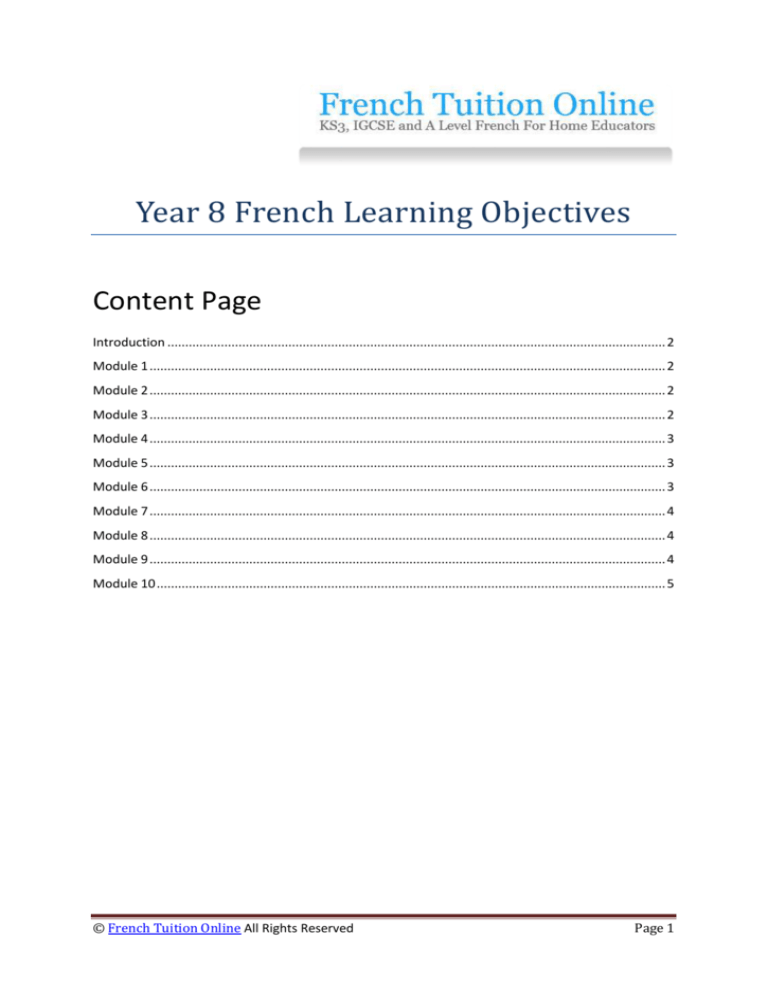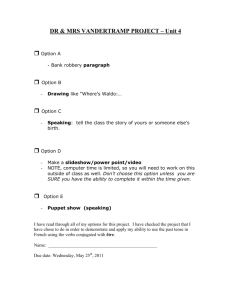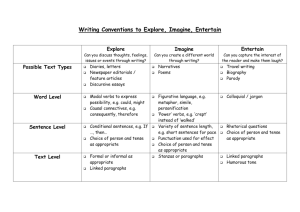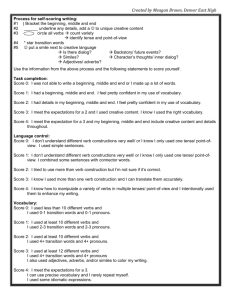
Year 8 French Learning Objectives
Content Page
Introduction ............................................................................................................................................ 2
Module 1 ................................................................................................................................................. 2
Module 2 ................................................................................................................................................. 2
Module 3 ................................................................................................................................................. 2
Module 4 ................................................................................................................................................. 3
Module 5 ................................................................................................................................................. 3
Module 6 ................................................................................................................................................. 3
Module 7 ................................................................................................................................................. 4
Module 8 ................................................................................................................................................. 4
Module 9 ................................................................................................................................................. 4
Module 10 ............................................................................................................................................... 5
© French Tuition Online All Rights Reserved
Page 1
Introduction
In year 8 students discover the past and future tenses while consolidating the present tense
and the immediate future learnt in year 7. They are gently introduced to more advanced
work through the use of story lines, videos, dialogues and audio materials. Below is a
detailed outline of what students will learn in each module.
Module 1
In module 1, students will learn:
1. how to talk and write about the four seasons of the year
2. to use more words and expressions related to free-time and activities
3. to conjugate irregular verbs in the present tense such as the verb ‘lire’ (to read),
‘prendre’ (to take, to have a meal), ‘boire’ (to drink) or ‘partir’.
4. when and how to use ‘ce, cet, cette, ces,’ (this, that, these, those’) before nouns
Module 2
In module 2, students will learn:
1. the range of expressions using ‘avoir’ in the positive (J’ai faim- I am hungry) and
negative forms (Je n’ai pas faim- I am not hungry).
2. more expressions related to free-time activities and travel.
3. how to speak and write in the past tense using le passé composé (the perfect tense)
with regular and irregular verbs .
Module 3
In module 3, students will learn:
1. how to talk and write about visiting cafés and restaurant
2. more about the perfect tense and the negatives to say what did not happen
3. more irregular verbs in the present and past tenses: i.e. ‘ouvrir’ (to open), ‘suivre’ (to
follow)
4. the verb ‘savoir’ (to know[a fact]) and ‘connaître’(to know [a person]) in the present
tense
5. the verbs conjugated with être in the passé composé
6. about the agreement of past participle of être verbs with the subject. i.e. Nous
sommes allés (we went)
© French Tuition Online All Rights Reserved
Page 2
Module 4
In module 4, students will learn:
1. learn More about the language of restaurants and cafes
2. revise and practise lots of the French you have learnt so far
3. about the reflexive verbs (les verbes pronominaux) in the perfect tense (passé
compose) in the positive (Je me suis lavé- I washed myself) and negative forms (Je ne
me suis pas lave- I did not wash myself)
4. how ‘which’ before a noun can be translated by ‘quelle, quel, quelles’ or ‘quels’ and
when to use either of them.
5. how direct objects pronouns (i.e. I see them- Je les vois) are translated in French
Module 5
In module 5, students will:
1.
2.
3.
4.
5.
6.
how to speak and write about feeling ill, accidents, injuries and mishaps
how to speak and write about going to the doctor’s
the parts of the body
the idiom ‘avoir mal….’ (to have pain in…)
about going to the doctor in France
how to tell people what to do and the use of the imperative in the positive and
negative forms
7. more expressions to express the negative form. i.e. ‘ne…rien’, ‘ne…jamais’,
‘ne….personne’…etc
8. more irregular verbs: the verbs venir (to come) and tenir (to hold)
Module 6
In module 6, students will learn:
1. be introduced to the imperfect tense and how to form it
2. learn about descriptions in the past using the imperfect tense
3. learn how to use the passé compose (perfect tense ) and the imperfect tense
(imparfait) in a description
4. learn how to use the imperfect in the expression ‘used to be’ and comparisons
between before and now. i.e. Before I used to be weak but now I am strong - Avant
j’étais faible but maintenant je suis fort…
5. revise the different kinds of pronouns that exist in French (Subject pronouns i.e. il,
ils; Direct object pronouns i.e. le, les; Indirect object pronouns i.e. lui, leur)
© French Tuition Online All Rights Reserved
Page 3
6. learn how to compare people and things in French using comparatives
7. learn about the verbs that are followed by ‘á + infinitif’ and ‘de + infinitif’ i.e.
continuer á…, décider de…
Module 7
In this module 7, students will:
1.
2.
3.
4.
learn more about finding your way in a French town
learn les nombres ordinaux i.e. first, second…etc
learn the vocabulary linked to directions. i.e. to the left, to the right…etc
learn about reported speech; i.e. Elle a demandé à Charles de fermer les fenêtresshe asked Charles to close the windows
5. revise verbs tenses and conjugation; the present, the perfect, the imperfect and the
immediate future
Module 8
In module 8, students will:
1.
2.
3.
4.
5.
learn more about a French town
learn about spending money
learn about new and useful constructions
learn how to form the present participle
learn how to translate expressions such as ‘while, by, on + present participle - i.e
while driving or on arriving (en conduisant, en arrivant)
6. be introduced to a dictée in French
Module 9
In module 9, students will revise year 7 learning objectives including:
1. numbers 1- 100
2. the masculine and feminine used for nouns (le, la, un, une)
3. how to conjugate the verbs Avoir and être (to be and to have) in the present tense
4. how to say how old you and others are, when is yours and others’ birthday.
© French Tuition Online All Rights Reserved
Page 4
5. the verbs in of the first group (ending in –ER)
6. how to say ‘to’ and ‘at in French (use of à, , à la, à l’, au, aux or chez in French)
7. the possessive pronouns ‘my’, ‘your’, ‘his’ and ‘her’ in French ( mon, ma, mes, ton, ta, tes,
son, sa, ses
8. the reflexive verbs – i.e. se laver, se coucher- (to wash oneself, to go to bed) in the
present tense
9. how to express negation
10. how to express quantity
11. the days of the week and the months of the year
12. the different method of transport
13. clothes, colours and adjectives
14. how to ask a question in French
15. Tthe expressions with ‘avoir’
16. the immediate future
Module 10
In module 10, students will:
1. Revise all the French grammar learnt in book 2
2. Learn new vocabulary
© French Tuition Online All Rights Reserved
Page 5








